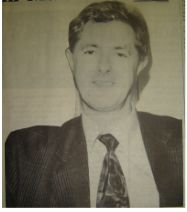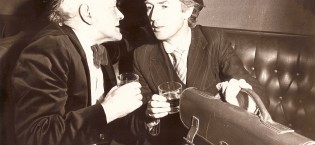Deep Thinking From the “Tin Man”
 The benefits of a third level education institution to a town like Sligo cannot be overstated. The influence of the 2,000 young students who attend Sligo Regional Technical College is normally measured in economic terms, which is legitimate given the spending power they generate throughout the town. But can you imagine the impact that 2,000 fresh, imaginative, searching minds could have on the cultural environment of the town? Until recently, this was an aspect of the college’s potential which remained relatively untapped. This week, at the Hawk’s Well, the bottle is about to be unscrewed as students from the college combine their talents with some of the most accomplished performers in local amateur drama in a production of Tom Murphy’s “On the Outside / On the Inside”.
The benefits of a third level education institution to a town like Sligo cannot be overstated. The influence of the 2,000 young students who attend Sligo Regional Technical College is normally measured in economic terms, which is legitimate given the spending power they generate throughout the town. But can you imagine the impact that 2,000 fresh, imaginative, searching minds could have on the cultural environment of the town? Until recently, this was an aspect of the college’s potential which remained relatively untapped. This week, at the Hawk’s Well, the bottle is about to be unscrewed as students from the college combine their talents with some of the most accomplished performers in local amateur drama in a production of Tom Murphy’s “On the Outside / On the Inside”.
The unique link between the college’s Drama Society and the Sligo Drama Circle is being orchestrated by John Gaffney, a lecturer in the college who has so many strings to his bow that one wonders where he found the time. But we should be extremely grateful that he has, because the fusion of fresh talent uncovered on the college campus with the existing wealth of established ability in the town at large is one of the most exciting developments in local drama for many years. And John Gaffney, it would appear, was destined to be the man to make it possible. A native of Middleton, Co. Cork, he is already an award-winning playwright; a founder member of Sligo’s first professional company, Sevenwoods; an actor of no mean repute; and a poet whose topical verse has won him a wide readership in “The Sligo Champion”. John lectures in psychology, and unlike many whose involvement in drama offers a “switch-off from the real world, it appears that his association with theatre is an extension of his day-time job.
“I am attracted by the psychology of it all”, he concedes. “It’s a fascinating study in itself, to watch people become somebody else, to convince people to be somebody else. It’s a dynamic process”. Such analysis illustrates that John Gaffney is a “deep thinker” on the subject – no mere scratching on the surface here. And yet, it wasn’t until he came to live in Sligo in 1979 that he began to take drama seriously. In fact, he had caught the drama bug early in life, but it had been dormant for many years before being re-awakened by the cultural vibes which inhabit Sligo and which have inspired many a great man and woman through generations. As a youngster growing up in Middleton he was a regular performer in variety shows organised by his uncle to entertain those who had given up everything else for the Holy Season of Lent.
“We had a variety troupe which would put on all sorts of shows, and I would play guitar and banjo and sing a few songs. I graduated from there to pop groups and rock ‘n roll, whatever happened to be ‘in’ at the time. I was fascinated by it even hen”, he recalls. Strangely, though, the fascination waned during his days at UCC, where he blissfully ignored the campus drama society and all things associated with it. Six years working in Dublin did nothing to spark the creative flame. “I’m not a city person, so I was never really happy in Dublin. My wife, Joy and I, came to Sligo in search of the sense of close community that we had grown up with, and, by and large, we have found it”, he explains. That sense of community encourages artistic expression moreso than the anonymity of a big city, and for the first time since his teens John was able to explore his talent as a performer.
He was still very raw when he won a part in Sligo Drama Circle’s production of a Seán O’ Casey play. He was asked if he would like to ‘read’ for the part, and he admits that he didn’t understand the term. Nonetheless, he took to it like the proverbial duck to water, and he hasn’t looked back since. “The old flame was suddenly re-discovered. It was thrilling to find how much I enjoyed it, and it has a hold on me since”, he says. The early singing experience came in handy when he played “The Tin Man” in Sligo Fun Company’s production of “The Wiz” – he even learned to dance – and he went on to do more plays with the Drama Circle, finding the whole process an education in itself. He made it onto the silver screen as a solicitor in Liam Mc Kinney’s highly acclaimed film “Vandals” as part of the RTE Community Access Television series.
He joined Frank Conway, John O’ Dea and others in setting up Sligo’s first professional theatre company, Sevenwoods, and appeared in its first production, “Blood Wedding”. Although Sevenwoods has not survived, John feels passionately that Sligo needs its own professional company. “Sevenwoods didn’t work out mainly because the financial constraints were burdensome. It cost us £15,000 to mount a show and trying to find that sort of money without any significant help from the Arts Council, was a major problem for us. We lacked management experience”. Despite that experience, he believes Sligo could support a professional company, provided it was adequately supported by the Arts Council and attached to the Hawk’s Well. “It’s a pity that a company wasn’t set up in conjunction with the Hawk’s Well from the beginning. The Druid company is a perfect example of how successful such an arrangement can be, and it has also happened in such places like Waterford, Limerick and most recently, Kilkenny. There is a huge commitment to drama in Sligo and, therefore, I’m convinced a professional company could survive”.
Drawing on his experience with the Sevenwoods project, John rejuvenated the Drama Society in the Regional College, taking it “by the scruff of the neck”, and breathing life into it. There was a willing response from the student body, particularly from the females who are much more demonstrative and less inhibited than their male counterparts, according to John. Success wasn’t long coming. The society scooped a bagful of awards at festivals throughout the country, and won three major awards in the NWR Radio Play competition, including “Best Playwright” award for John for his play “Loss”, which dealt with the traumatic subject of a child’s death. “Thankfully, I have not gone through that experience in my own family, but I know a couple who have, and I tapped into their story. I think it’s a nightmare which haunts all parents”, he says.
In any event, encouraged by the blossoming talent of the RTC students, John approached the Drama Circle with his idea of a joint project, and the response was totally positive. He heaps praise on the college’s Dramatic Society chairperson, Yvonne Kennedy, for the trojan work she has done in bringing the dream to reality. The results of all the endeavour are on public view at the Hawk’s Well this week with twelve students from the college joining with names such as Columb Mc Bride, Nora Ryan, Ursula Smullen, Ann Marie Byrne and Siobhán Dooney in John’s production of “On the Outside, On the Inside”. It’s a big test for the students, but it’s a big challenge for John Gaffney, too, in his first major role as producer. “I have found it tense, because I would have very different views on how it should be done and I’m working with a lot of people who have done it all before. But we’re all striving for perfection, and I’m quite satisfied that we have come up with a very entertaining show”, he says.
The story has a “Ballroom of Romance” type setting in Ireland, 1958, a period which marked the end of an era in the development of the nation. The swinging sixties were just around the corner, and things have never been the same since. “The play itself is a very good education for the students, because it makes very strong statements about the Ireland of that time. But, generally, their involvement in drama is a great educator for them, particularly since the RTC would have a profile of being a very hard, technical sort of place. These students are proving that the college has a contribution to make to the cultural life of Sligo as well, and I think that’s important”, John declares.
An interview by Jim Gray in The Sligo Champion, Showstopper Series, April 30th, 1993
Tags: History, Reflections






